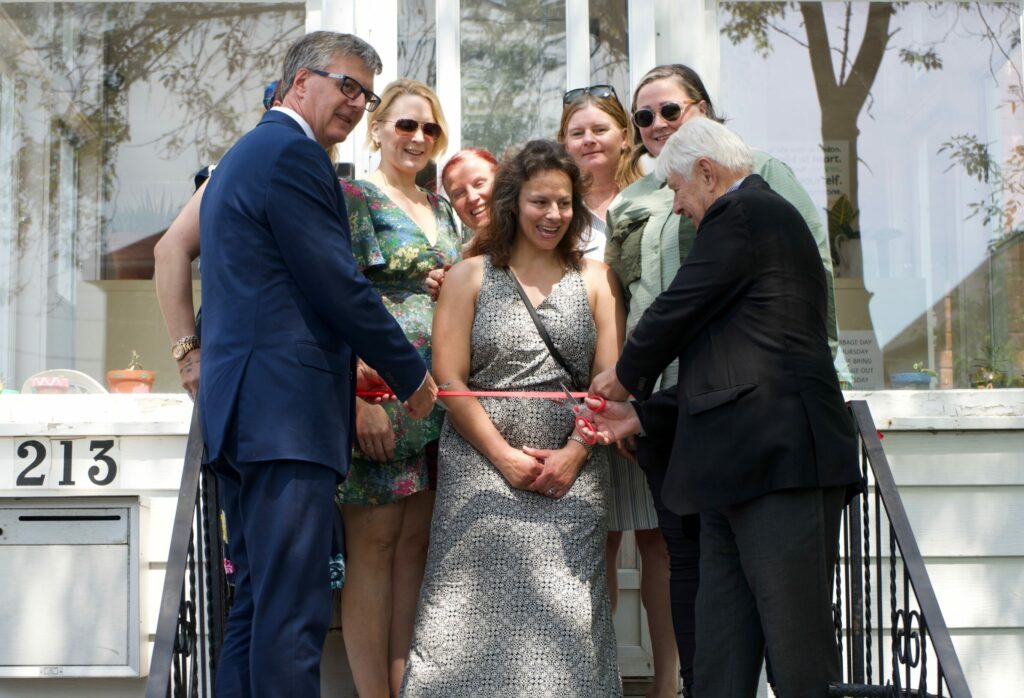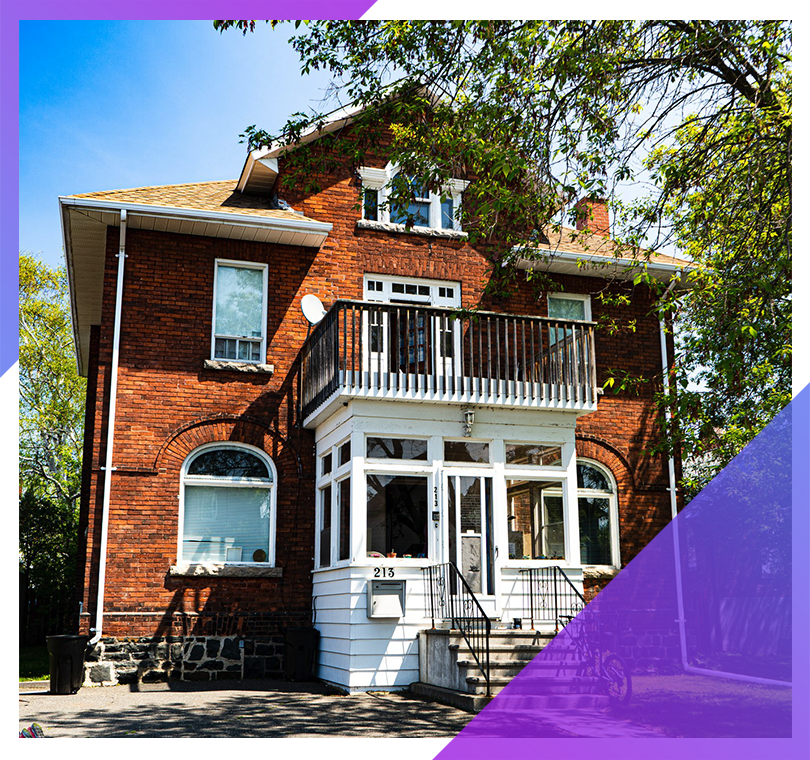Transitional Housing
In April 2021, EFry NWO established low-barrier transitional housing for women and gender-diverse people experiencing severe forms of marginalization. This includes criminalized individuals living with mental health differences, substance use health needs, and other adversities.
EFry NWO is recognized as providing housing for individuals who are vulnerable and face significant challenges in finding and maintaining housing. We prioritize filling local housing gaps for Indigenous women* and 2SLGBTQI+ individuals, who are especially vulnerable to gender-based violence and systemic oppression.
The Transitional Housing Program is grounded in the principles of harm reduction that are responsive to the diverse and evolving needs of the individuals that we serve. The focus of our housing is to help individuals find and maintain permanent housing consistent with their individual needs. The EFry Circle of Care uses an approach that considers the impacts of trauma in all aspects of service delivery and prioritizes the individual’s safety, choice, and control.
EFry NWO provides residents with a fully furnished home, offering both private and semi-private rooms, and with sufficient food, household items and hygiene items upon their moving in. Residents also have access to seasonally appropriate clothing, transportation assistance and access to our biweekly food bag program. Throughout their occupancy, the residents are supported by 2 System Navigators, the Reintegration Navigator, and the Overnight Harm Reduction Support, who work in collaboration to provide a Circle of Care. We currently have one Harm Reduction Overnight Support who oversees the homes 4 evenings per week. Staff attend the homes daily to meet with the residents, hold house meetings, carry out programming, and resolve any conflicts.

Photo credit: Robyn Saxberg, PMCP | EFSNWO
We offer both harm-reduction-based, low-barrier transitional housing and a more structured transitional home for individuals well on their recovery journey. This allows us to maintain housing security for individuals through life’s inevitable ups and downs. If an individual living in the Cameron St. home becomes unable to comply with the level of structure, they can be transferred into the lower barrier home to work on stabilization. This allows us to prevent re-entry into homelessness and continue providing support to the individual when otherwise they may be discharged into the shelter system. This supports the notion that recovery is often cyclical and not linear.

Photo credit: Robyn Saxberg, PMCP | EFSNWO
#CommunityStrongerTogether
- Referrals from our housing program are made to Balmoral Detox Centre, Norwest Community Health Centres, RAAM, Elevate NWO, VAW Shelters, Income Supports, and Treatment Centres.
- Thunder Bay Correctional Centre social workers collaborate with EFry NWO on release planning which often includes referral to our transitional housing. They also notify us when an individual is about to be released and is in need of housing.
- Norwest Community Health Centre: Delivers the Safe Supply program to participating residents of our harm reduction housing. EFry NWO houses participants of the safe supply program whenever possible.
- We are members of the Thunder Bay Regional Food Distribution Association and receive food for our food bank for individuals to access every two weeks.
- TBDSSAB: Provides rental agreements between EFry NWO, the resident, and OW/ODSP.
- Ontario Works / ODSP provides basic needs income and rent for individuals.
- Support for residents is provided in part by our System Navigators, who are funded by Reaching Home, an initiative of the Federal Government.
- Thunder Bay District Health Unit Street Nursing Team and Norwest Community Health Centre: Provides primary healthcare to residents of EFry NWO transitional housing.

Photo credit: Robyn Saxberg, PMCP | EFSNWO
Overnight Housing Support
The transition from incarcerated spaces back into society is a critical juncture that can shape an individual’s trajectory toward stability and well-being. For individuals who have experienced incarceration, especially women and gender-diverse individuals, the challenges of reintegration are compounded by systemic barriers, discrimination, and the heightened risk of homelessness, gender-based violence, and drug poisoning.
Providing dedicated support staff is a proactive strategy to break the cycle of vulnerability and promote lasting positive change.
1. Mitigating Homelessness and Rough Sleeping
Systemic and societal factors contribute to a higher likelihood of homelessness and rough sleeping among those exiting incarcerated spaces. Without safe and stable housing options, individuals are forced to sleep rough, exposing them to a range of risks, including exposure to the elements, violence, and exploitation. Safer housing upon release offers a secure foundation from which to rebuild one’s life, regain a sense of agency, and seek meaningful opportunities.
2. Addressing Gender-Based Violence
For women and gender-diverse individuals exiting incarceration, the risk of gender-based violence is particularly concerning. The vulnerabilities inherent in homelessness, substance use, and systemic discrimination intersect to create an environment where individuals are disproportionately targeted for victimization.
Providing secure housing is a fundamental step toward ensuring physical safety and protection from gender-based violence. It allows survivors to heal, regain autonomy, and engage in trauma-informed services that are crucial for their well-being.
3. Preventing Drug Poisoning and Overdose Deaths
The opioid epidemic has claimed countless lives, with individuals exiting incarcerated spaces being at a heightened risk of drug poisoning. The lack of stable housing often forces individuals into situations where they are exposed to dangerous substances, increasing the likelihood of fatal outcomes. Offering safe and harm-reduction-focused housing environments provides individuals with the opportunity to access support, education, and resources for managing substance use health issues. This proactive approach prevents unnecessary deaths and facilitates the path to recovery.
4. Fostering Reintegration and Recovery
Safer housing after incarceration is not just about providing a roof overhead; it’s about enabling reintegration and recovery. It creates an environment where individuals can access supportive services, mental health resources, substance use treatment, and educational opportunities. With stable housing, individuals have the space and stability to address the underlying factors that may have contributed to their incarceration in the first place. This approach aligns with the principles of restorative justice and rehabilitation, aiming to break the cycle of reoffending (recidivism) and incarceration.
Timeline of EFry NWO Transitional Housing Growth
EFry NWO opened its first-ever low-barrier, harm-reduction transitional housing in Limbrick Place, offering 3 spaces to individuals in need.
Moved locations to an apartment on May St., which expanded our housing capacity to 4 spaces.
Expanded into the 2nd floor of the May St. building, allowing us to provide housing to 7 individuals in need.
EFry NWO opened its second transitional home. The addition of this tri-unit home allowed us to expand our capacity to 24 spaces for women and gender-diverse people in need of housing.
EFry NWO opened its first transitional home. The addition of this 5-bedroom home on Cameron St. allowed us to expand our capacity to 12 spaces.
Initiated a pilot Emergency Bed Program, providing emergency shelter for 4 individuals, 4 nights per week during the winter months.
EFry NWO opened its second transitional home. The addition of this tri-unit home allowed us to expand our capacity to 24 spaces for women and gender-diverse people in need of housing.
The EFry NWO Emergency Bed Program runs for the second time, providing emergency shelter for 6 individuals, 3 nights per week during the winter months.
Contact Information:
Bonnie Aggamway
System Navigator
tel:
bonnie.aggamway@efsnwo.com
Kayla Baxendale
System Navigator
tel:
kayla.baxendale@efsnwo.com
Raeanne Oflaherty
Overnight Harm Reduction Support
tel:
raeanne.oflaherty@efsnwo.com
Generously funded by:


